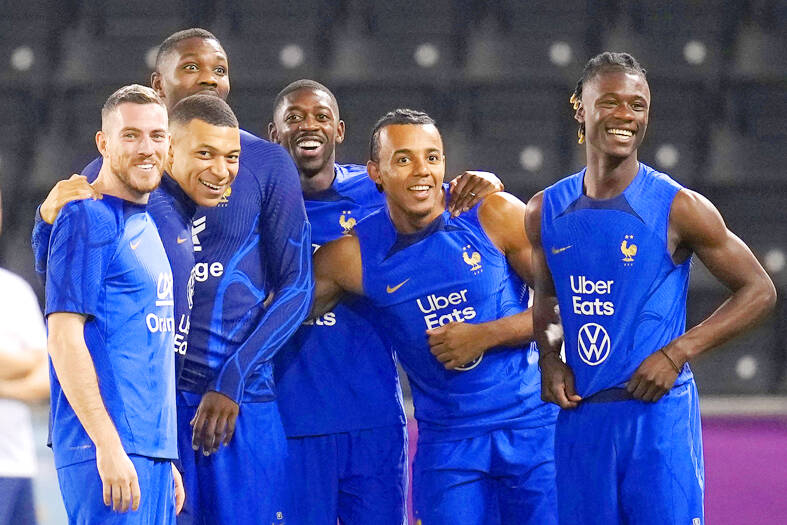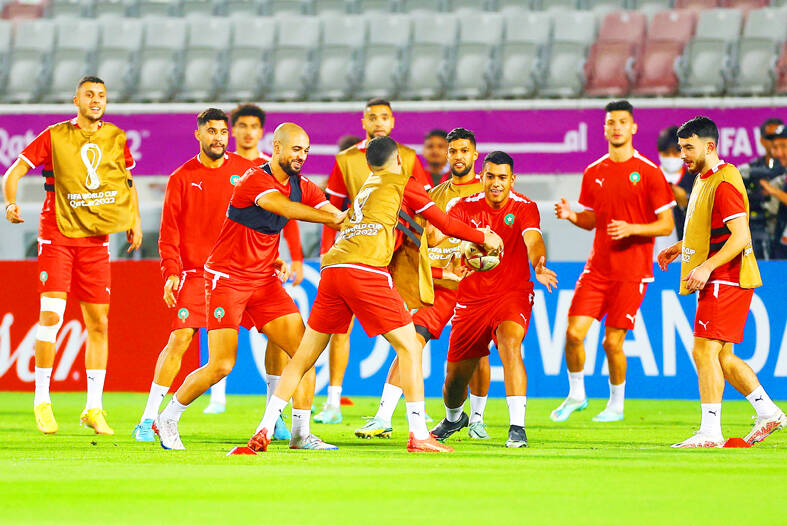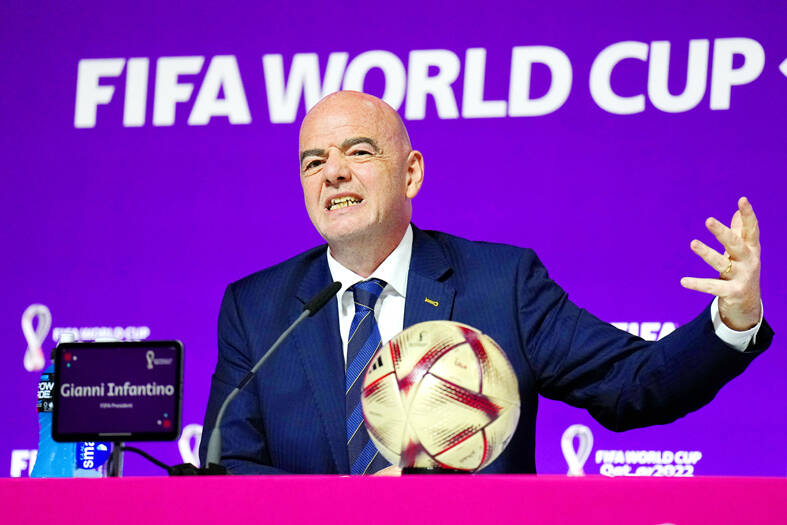With the most compact FIFA World Cup ever to reach a climax in Qatar with the final to be played tonight, the baton will be passed to 2026 cohosts the US, Mexico and Canada for what promises to be a super-sized global soccer showcase with more games and travel — and much more beer.
After controversially awarding host duties to Qatar, a country smaller than the US state of Connecticut, soccer’s governing body FIFA is going big in 2026, increasing the number of teams from 32 to 48 with games over three nations and as many time zones.
The last time Mexico (1986) and the US (1994) hosted a World Cup there were 24 teams.

Photo: AP
With 16 cities across the US, Canada and Mexico to stage matches, the logistics will be mind-boggling even before adding in 48 team training bases.
The 2026 tournament is to return to its traditional summer window after being played in November and December in Qatar to avoid searing June and July temperatures. Most of the competition will be in the US, which is to see 11 cities from New York to Los Angeles get 60 of the 80 matches, including the quarter-finals, semi-finals and final.
Mexico City, Guadalajara and Monterrey are the Mexico venues, with Toronto and Vancouver getting Canadian hosting responsibilities.

Photo: Reuters
While the Qatar World Cup has at times been overshadowed by the Gulf state’s treatment of migrant labor and its approach to LGBTQ issues and other social laws, FIFA president Gianni Infantino heaped praise on the action on the pitch, describing the group stage as the best ever.
That tried and tested format of eight groups of four teams, which has kept hundreds of millions of fans enthralled, could be ripped up for 2026 as FIFA considers plans to have 16 groups of three teams in the first phase.
More teams will mean more surprises, like Saudi Arabia beating Argentina in their group opener, said Jurgen Klinsmann, who won a World Cup with Germany and later coached the US men’s national team.

Photo: AP
“We are going to see more surprises coming from Africa and Asia in the [2026] tournament,” Klinsmann, the head of FIFA’s technical group, told reporters in Qatar.
The 32-team World Cup in Qatar has 64 matches — including the third-place playoff, which Morocco and Croatia were to play after press time last night — completed in 29 days, and, for now, the 2026 finals will be 80 games over 32 days.
With four-team groups, there would be 104 matches, requiring at least an extra week.
However, more matches would mean more television rights money and, as the World Cup brings in about 90 percent of FIFA’s revenue, its leaders will be tempted.
The World Cup in Qatar has earned US$7.5 billion in rights and sponsorship revenue, US$1 billion more than the 2018 finals in Russia, FIFA said last month.
One sponsor almost certainly looking forward to 2026 is Budweiser, the official beer of the World Cup, which had the taps at stadiums turned off by Qatari officials just days before the start.
The first World Cup held in a Muslim country with strict controls on alcohol, it was a challenge to find beer or alcohol in Qatar, and it was expensive, but in 2026 the taps will be flowing at 20 stadiums along with fan zones packed with thirsty supporters.

Taiwan’s participation in the Olympic Games has been a story of politics as much as sports, with the name it has competed under since 1984 — Chinese Taipei — drawing as much attention as its athletes. However, with the Games of the XXXIII Olympiad set to begin in Paris on Friday, the exploits of Taiwan’s athletes past and present who have won 36 medals since the country’s debut in Melbourne in 1956 deserve a nod. Many of Taiwan’s medal winners have gained considerable name recognition, but only two have achieved legendary status — Maysang Kalimud and Chi Cheng, the only medal winners

Shohei Ohtani on Sunday hit a 473-foot (144m) home run as the Los Angeles Dodgers went deep six times in a 9-6 victory over the Boston Red Sox. Freddie Freeman, Teoscar Hernandez, Gavin Lux, Austin Barnes and Jason Heyward also connected as Los Angeles swept the three-game series. “Going into the break, we weren’t playing good baseball, and then to come out fresh against a really good ball club and to play the way we did — the offense came to life,” Los Angeles manager Dave Roberts said. It was the 25th time the Dodgers launched at least six homers in a game

Canada women’s soccer coach Bev Priestman on Wednesday said she would step away from the team’s opening game against New Zealand at the Paris Olympics in the wake of a drone scandal. New Zealand complained to the International Olympic Committee’s integrity unit after it said drones were flown over closed practice sessions earlier in the week. As of press time last night, Canada, the defending Olympic champions, were set to open the Paris Games against New Zealand in Saint-Etienne. In the fallout of the complaint, two staff members — assistant coach Jasmine Mander and analyst Joseph Lombardi — were sent home, the

Conventional wisdom dictates that the average retirement age for elite female players in the intense and physically demanding sport of badminton is well under 30 years old. Five female shuttlers are set to turn that on its head when they make their fourth Olympic appearances at the Paris Games, a feat never accomplished before. Taiwan’s Tai Tzu-ying, 30, Thailand’s Ratchanok Intanon, 29, Belgium’s Lianne Tan, 33, and Hong Kong’s Tse Ying Suet and Canada’s Michelle Li, both 32, are to compete for Olympic glory at Porte de La Chapelle Arena from Saturday to Aug. 5. “These achievements get missed because they’re women,” said